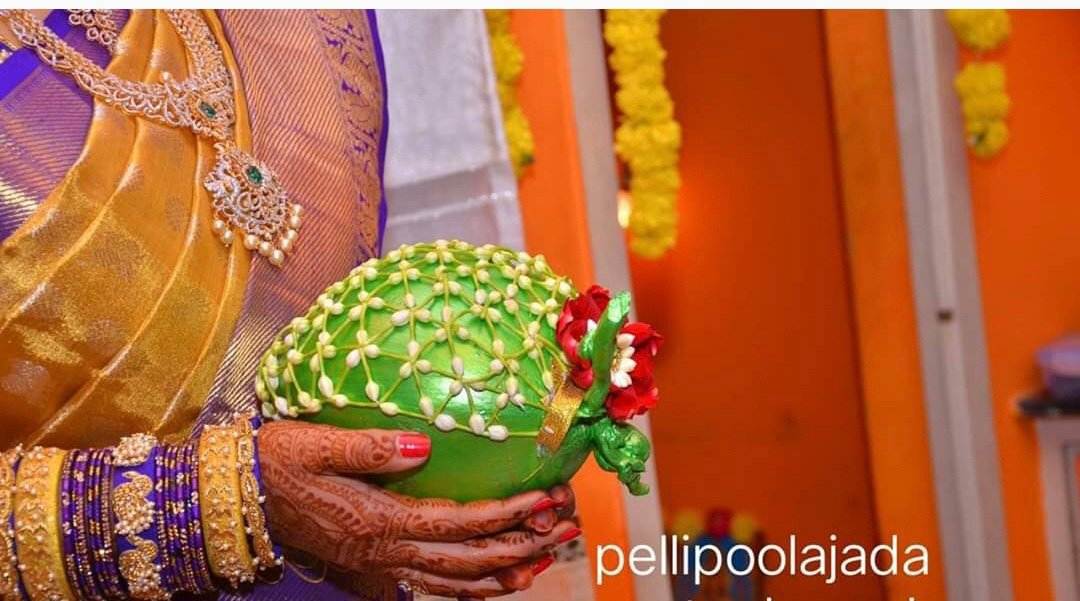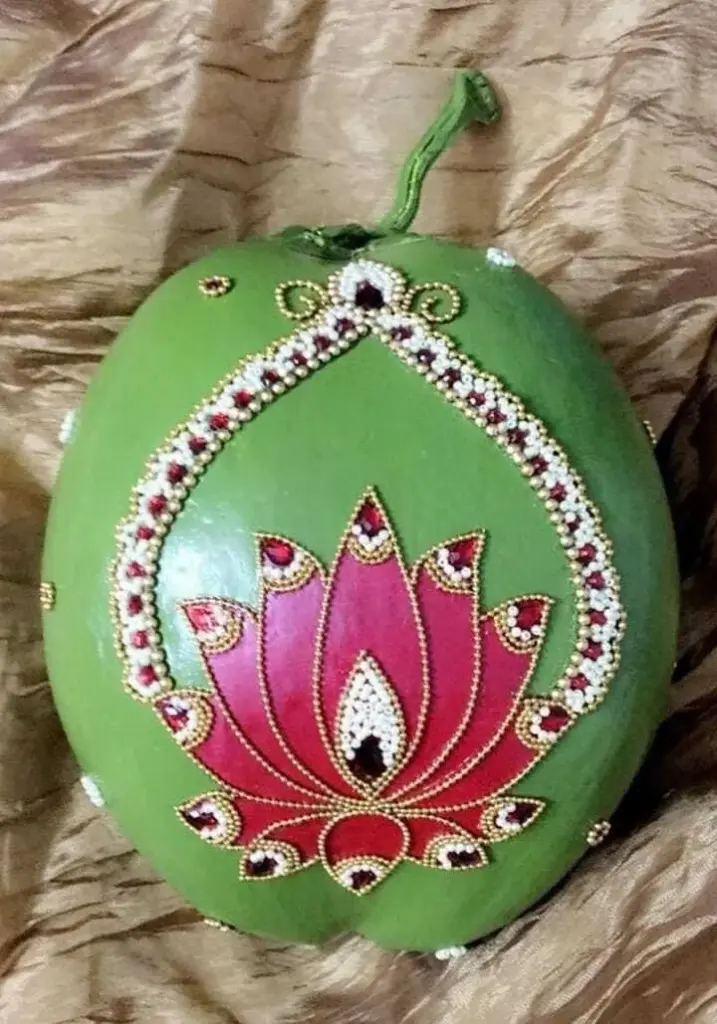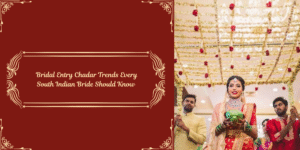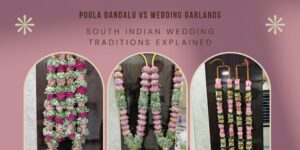Imagine stepping into a South Indian wedding ceremony, where every detail is a vibrant reflection of tradition and celebration. Among the colourful decorations and joyful music, there’s one element that stands out: the Kobbari Bondam. These beautifully adorned coconuts hold a special place in the hearts of brides and grooms, symbolising blessings, prosperity, and the start of a new journey together.
In this article, we’ll delve into the enchanting world of Kobbari Bondam designs, exploring 19 stunning options that add flair and cultural richness to the festivities. Get ready to be inspired by the intricate patterns, symbolic motifs, and timeless elegance of these coconut decorations as we unravel the magic of South Indian wedding traditions.
Importance of Dry Coconut in South Indian Wedding
In South Indian weddings, every element holds special meaning, and the dry coconut, known as “Kobbari Bondam” in Telugu, is no exception. It symbolizes fertility, prosperity, and new beginnings, making it a significant part of wedding rituals.
From intricate designs to personal touches, Kobbari Bondam adds a touch of tradition and symbolism to the celebrations, making it a cherished aspect of the ceremony.
19 kobbari bondam designs for wedding
1. Intriguing Mirror Work:
Mirror work, also known as “shisha” or “abla,” is a traditional Indian embroidery technique that involves attaching small pieces of mirrors to fabric. When incorporated into Kobbari Bondam designs, mirror work creates a dazzling effect that captures the eye and sparkles in the light
2. Vintage Charm of Antique Embellishments:
Antique embellishments evoke a sense of nostalgia and romance, adding a touch of old-world charm to Kobbari Bondam designs. The coconut décor is given a feeling of antiquity and legacy by the use of vintage-inspired elements including floral patterns, filigree patterns, and elaborate designs that evoke bygone ages.
3. Wholesome Embroidered Designs:
Intricate embroidery on Kobbari Bondam designs showcases the skill and craftsmanship of artisans, adding a touch of artisanal flair to the coconut decor. The Kobbari Bondam is elegantly and gracefully embellished with gorgeous patterns and motifs created by traditional embroidery techniques including zardozi, kantha, and chikankari.
4. The Meaning Behind Sacred Symbols:
In Indian culture, sacred symbols like “Sri” and “Swastika” have great spiritual meaning and stand for good fortune, wealth, and divine favor. These holy symbols, when used in Kobbari Bondam patterns, call forth blessings for a peaceful and successful marriage.
5. Imaginative Tassel Accents:
Tassel accents give Kobbari Bondam designs a fun and jovial touch while bringing joy and laughter to the bridal festivities. Tassels, which are made of vibrant threads or beads, sway softly in the wind to add movement and vibrancy.
6. Regal Kundan Embellishments:
Kundan embellishments add a touch of luxury and opulence to Kobbari Bondam designs, evoking the grandeur of Indian royalty. When incorporated into Kobbari Bondam designs, Kundan embellishments elevate the coconut decor to a symbol of royal splendor.
7. Whimsical Butterfly Motifs:

Butterflies symbolize transformation, growth, and new beginnings, making them a popular motif in wedding decor. Kobbari Bondam adorned with butterfly motifs evoke a sense of joy, freedom, and optimism, symbolizing the couple’s journey towards marital bliss.
8. Rustic Charm of Jute Embellishments:
Eco-friendly jute embellishments add a touch of rustic charm to Kobbari Bondam designs, reflecting the couple’s commitment to sustainability and environmental consciousness. Jute, a natural fiber derived from the jute plant, is known for its durability and versatility.
9. Elegant Pearl Accents:
Pearls symbolize purity, innocence, and wisdom, making them a timeless choice for wedding decor. Kobbari Bondam adorned with pearl accents exudes elegance and sophistication, adding a touch of refinement to the coconut decor. The lustrous beauty of pearls adds a subtle shimmer to the Kobbari Bondam, creating a sense of luxury and grace.
10. Creative Warli Designs:

Drawing inspiration from Maharashtra’s tribal art, Warli designs are characterized by their elaborate yet simple patterns that portray everyday and natural settings. An example of the couple’s enthusiasm for indigenous art forms and cultural variety is the Kobbari Bondam decorated with Warli art.
11. Contemporary Geometric Patterns:
Modern brides opt for Kobbari Bondam designs featuring contemporary geometric patterns, adding a touch of sophistication and style to the traditional coconut decor. The couple’s hopes for a solid and long-lasting marriage are reflected in geometric designs, which stand for harmony, balance, and unity.
12. Intricate Henna Patterns:
Inspired by the intricate designs of Mehendi, Kobbari Bondam adorned with henna patterns showcase the bride’s love for traditional artistry. Henna holds deep cultural significance in Indian weddings, symbolizing love, joy, and good luck. The elaborate patterns on the Kobbari Bondam add a touch of femininity and grace to the coconut decor, celebrating the bride’s beauty and individuality.
13. Symbolism of Peacock Motifs:
Peacock motifs hold profound symbolism in Indian culture, representing beauty, grace, and abundance. Adorning the Kobbari Bondam with peacock motifs symbolizes the couple’s aspirations for a vibrant and harmonious married life. The majestic presence of the peacock adds a regal touch to the coconut decor, signifying the couple’s hopes for a union filled with love, prosperity, and happiness.
14. Traditional Temple Designs:
Drawing inspiration from the rich architectural heritage of South Indian temples, Kobbari Bondam designs featuring traditional temple motifs pay homage to the divine. These intricate designs symbolize the couple’s reverence for tradition and spirituality, inviting blessings from the gods for a blessed and prosperous married life. The sacred imagery on the Kobbari Bondam creates a sense of sanctity and reverence, elevating the wedding ceremony to a sacred ritual.
15. Simple Design:
While intricate patterns can be charming, some couples like to keep their Kobbari Bondam understated and sophisticated. A simplistic approach to coconut décor highlights the coconut’s inherent beauty and highlights its symbolic importance in wedding customs.
16. Give It a Personal Touch:
Couples frequently add sentimental components to their Kobbari Bondam, like their names, initials, or wedding date. These customized elements serve as priceless keepsakes of the couple’s special day in addition to giving the coconut décor its own distinct personality.
17. Auspicious Lotus Motifs:
Lotus motifs symbolize purity, enlightenment, and prosperity in Indian culture. Brides adorn their Kobbari Bondam with these motifs to invoke blessings for a blissful married life. The lotus, being a sacred flower, adds an aura of auspiciousness to the wedding ceremony, signifying the purity and beauty that the couple aspires for in their union.
18. Cultural Emblems:
Infusing the Kobbari Bondam with cultural emblems pays homage to the rich heritage and traditions of South India. Whether adorned with motifs inspired by classical dance forms like Bharatanatyam or symbols representing regional customs, these designs celebrate the cultural diversity and artistic legacy of the region.
19. Stunning Sequins Embellishments:
Sequin embellishments add a touch of glamor and opulence to the Kobbari Bondam, making it a dazzling centerpiece of the wedding decor. The shimmering sequins catch the light, creating a mesmerizing effect that adds to the festive ambiance of the celebration, reflecting the joy and happiness of the occasion.
Conclusion
In conclusion, Kobbari Bondam designs offer a wonderful way to add beauty and tradition to South Indian weddings. From sophisticated lotus patterns to breathtaking sequin accents, every design adds a special charm to the event. There are countless possibilities for couples to choose from, whether they want a more ornate appearance or something simple and elegant.
In addition to adding to the wedding decor’s aesthetic appeal, these designs have profound cultural and symbolic significance. Couples can create a genuinely special and meaningful celebration that represents their love, heritage, and customs by including Kobbari Bondam in their wedding rituals.
FAQ
Can Kobbari Bondam designs be made at home, or are they usually purchased from vendors?
Both options are possible! While some couples prefer to purchase intricately designed Kobbari Bondam from specialized vendors, others opt for a DIY approach. With a little creativity and patience, Kobbari Bondam designs can be crafted at home using readily available materials, allowing couples to infuse their personal touch into the decorations.
Can Kobbari Bondam designs be used for other events besides weddings?
While Kobbari Bondam designs are commonly associated with weddings, they can also be used to adorn coconut decorations for various cultural festivals, religious ceremonies, and special occasions. The versatility of Kobbari Bondam designs allows them to add a touch of tradition and elegance to any event.
Are there any specific cultural meanings associated with the colors used in Kobbari Bondam designs?
Yes, colors often hold cultural significance in South Indian traditions. For example, red symbolizes prosperity and vitality, while yellow represents auspiciousness and joy. Green is associated with fertility and growth, while white signifies purity and new beginnings. Incorporating these colors into Kobbari Bondam designs adds layers of meaning and symbolism to the coconut decorations.





